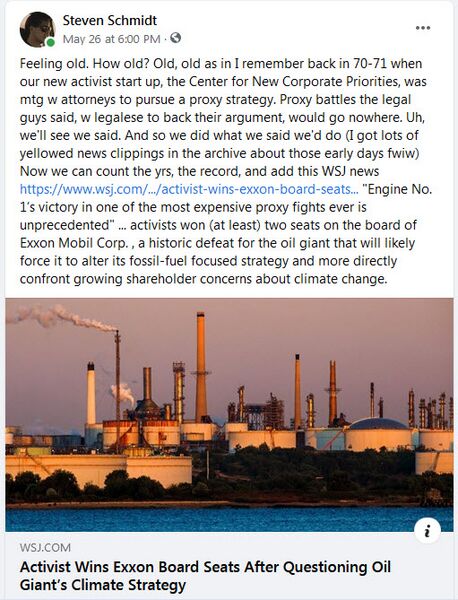File:SJS - May 26, 2021 Proxy memories.jpg

Original file (511 × 669 pixels, file size: 178 KB, MIME type: image/jpeg)
SJS:
In 1970 and 1971 a group of University of Southern California students started up the Center for New Corporate Priorities. The Center spun off of the Vietnam Moratorium Committee and then joined into the organizing of first Earth Day. Looking back, an origins story that spanned political boundaries can be clearly seen. A rising planet Earth on the cover of Life Magazine in January 1969 became iconic.
The modern environmental movement with revelations of Earthrise opened eyes to new challenges and possibilities. The beginnings of a new Earth Science and then results of multi-decadal Earth Science research from Space brought us never before appreciated connections and knowledge as planet citizens.
The years 1968-1971 changed forever our awareness as planet citizens, planet scientists.A 'whole earth vision' was springing up across borders of nations. A 360 perspective of the home planet was in the process of begin created. Activists organizing was growing and shaping a new found environmental, green diversity.
At USC, our group of activist students was in many ways out in front pushing a pro-peace agenda. A Congressman named George E. Brown inspired your GreenPolicy360 siterunner and together with Senator Gaylord Nelson, we hoped a first Earth Day would 'shift the priorities' and change corporate 'business-as-usual'. We got to work doing this.... small steps with marches, ripples with waves to follow...
··················································
On the 50th Anniversary
Memories on the Road to the First Earth Day
• https://www.greenpolicy360.net/w/Earth_Day_Memories_on_the_50th_Anniversary
Beginnings of the Modern Environmental Movement
• https://www.greenpolicy360.net/w/Category:Earth_Day
··················································
1971
The Los Angeles Center for New Corporate Priorities had two initial campaigns:
~ Mobilize a network of peace groups to continue anti-Vietnam war organizing and re-envision what an 'intelligent' (as opposed to self-defeating) national defense strategy will need to consist of ...
and
~ Oppose banking policies that segregate cities into lending and anti-lending zones... the Center for New Corporate Priorities published first-ever maps of US cities that identified "redlining" practices by banking. These redlining maps were then used by state legislatures to prevent discrimination that for decades had prevented wealth building thru real estate and economic development in poorer "redlined" neighborhoods in US cities...
·······································································
BANK OF AMERICA BIG COAST TARGET
Via The NY Times
May 1971
>The Center for New Corporate Priorities, started by students at the University of Southern California, has charged that the bank supports large farmers, thus repressing farm workers, and that it finances economic imperialism abroad, yet refuses to help minorities at home.
>The Center's major complaint, however, is the bank's involvement in Vietnam.
>Bank officials have many times “specifically rejected the charge that we as an institution support and profit from the war in Vietnam.” The bank also distributes personal statements by its officers who oppose the conflict.
>War Goods Are Financial
>Mr. Sullivan (of Bank of America) readily acknowledged, however, that “we finance many companies who produce goods and material used in the war.
>He added, “We have a role in letting our opinions be known about the war, but we shouldn't let those opinions cloud our banking decisions.”
>The root of the conflict between the bank and its critics is not over facts, but over premises. The bank continues to believe that “banking decisions” should be made, as Mr. Sullivan put it, on the basis of “economics, not politics.” Profit is still its major goal.
>To Ed Scanlon, of the Center for New Corporate Priorities, this attitude only “feeds the status quo” and does nothing to alter basic power relationships in the society. Louis B. Lundborg, who recently retired as chairman of the bank's board, recognized this cleavage in a speech last year.
>“We are facing a real honest-to‐God disenchantment,” he said, “not just a passing momentary flare‐up that will go away if we just keep it cool for a while.
>There is a new value system emerging in America, starting with the youth but becoming one of the new facts of life for the rest of us to deal with.”
~
File history
Click on a date/time to view the file as it appeared at that time.
| Date/Time | Thumbnail | Dimensions | User | Comment | |
|---|---|---|---|---|---|
| current | 15:33, 30 May 2021 |  | 511 × 669 (178 KB) | Siterunner (talk | contribs) |
You cannot overwrite this file.
File usage
The following 3 pages use this file: